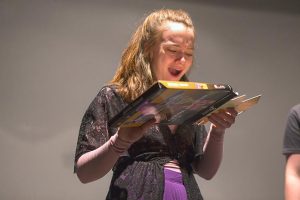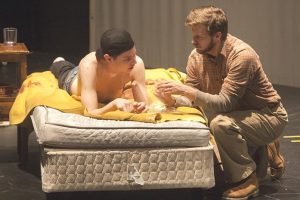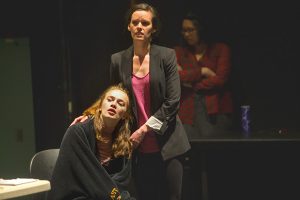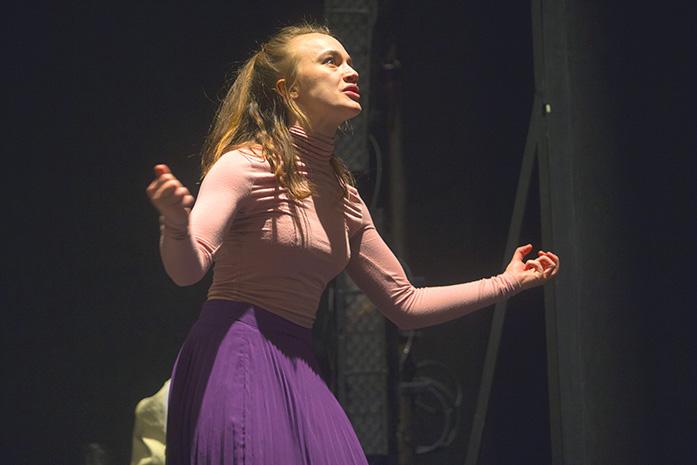By Isaac Hamlet
The University of Iowa’s annual New Play Festival packs full productions and readings of never-before-seen works into one week. Each night between May 1 and May 5, the Theater Building will début new plays. Over the course of the week, four stage productions and six readings will take place.The first of the productions is Seed, showing at 5:30 and 9 p.m. May 1 in the Theater Building’s Theater B, written by Scott Bradley and directed by Patrick Du Laney.
“I met Scott Bradley through mutual friends in the fall,” Du Laney said. “We realized we had similar aesthetics and decided to work together.”
Seed follows an agronomist searching for his son, who has recently, and mysteriously, disappeared. His search takes him to a motel, and his arrival draws the notice of the teenage Holler, the only other character in the play.

“From a dramaturgical point of view, it’s very easy,” Du Laney said. “From a rehearsal standpoint — no one can have a sick day. If someone’s even having an off day, the whole play is affected.”
The story is built on the interaction between the two, and tension grows as the play progresses. Both characters have something the other one wants, though neither necessarily knows that from the onset.
“Neither of [the characters] really knows who the other is,” Du Laney said. “The actors have read the play and figured out what their characters know in each scene. You have to not know what you know until you know it.”
The play is designed to make those watching feel uneasy, frightened, with its themes of genetic modification, so viewers should expect the characters to stumble across upsetting revelations as their conversations begin to boil over.
Du Laney believes “the hallmark of any good work is repetition.” Given how deeply involved each individual person has to be, the cast and crew have had the time to engineer something that does the trick.

After Seed wraps up, the second play, Tough, will tumble into Thayer Theater for a pair of shows at 5:30 and 9 p.m. on May 2.
Directed by Alison Ruth and written by Margot Connolly, the play follows a group of teenage girls at Crosswinds, a camp meant for “behavioral modification.”
However, the “behaviors” slated for “modification” are limited to their sexual preferences.
“The location is based on [places that Connolly] heavily researched,” Ruth said. “These sorts of camps are for profit — it becomes sort of like an Orwellian prison for these girls.”
There is a glimmer of relative hope for them, though, as a rumor begins to makes it rounds among the story’s six protagonists.
“There’s this rumor going around that if one of the girls dies, then the camp will have to be shut down,” Ruth said. “As the play goes on, their satiation intensifies, like a pressure cooker, as they wonder who going to kill and who’s going to be killed.”
With murder on most of the girl’s minds, the play contains a decent amount of violence.
Ruth described the violence as “functional,” serving the story without being gross or over the top.
“I hope that [audiences] leave with a sense that context is everything for morality,” she said. “The sense that anyone is capable of anything at any time; that morality is based on these structures we’re raised in.”

A break occurs in the middle of the week between productions, with two readings occurring on Wednesday.
Then, on May 4 finds the staged productions returning with AURORA FRA BERGEN, or, IBSANITY, written and directed by Nina Morrison. She became determined to do the play after she worked on a Henrik Ibsen play.
“I directed Lady from the Sea; it was a wild ride of a play,” she said. “A lot of the time I was confused as to what Ibsen thought of the play — did he think it had a happy ending? I think he did, but I can’t be sure.”
She fixated so intensely on Ibsen and his famous “well-made play” structure that when she went on to compose her own work, she couldn’t help but write a response to Ibsen’s.
“I wanted to write a modern version,” Morrison said. “A young woman is married to an older woman in a marriage of convenience. It’s set in modern Norway, where this young woman is visited by a former lover who seems to have a psychic power over her.”
She became fixated on the twist in the last three pages of Lady from the Sea, when the protagonist abruptly abandons her exotic lover for the marriage of convenience.
As she began to drill into that idea, she also began to work around the “well-made play structure” — and while she ended up not quite meeting the form requirements, she developed a new respect for it.
“I realized how modern and relevant of a writer [Ibsen] is,” she said. “I cannot deny the form — in the same way people respond to the hero’s journey form, they respond to this. It’s amazing.”

The New Play Festival wraps up May 5 with The Pirate Queen, a comedy set in the golden age of Hollywood.
“There’s a movie happening called The Pirate Queen,” said Catie Councell, who plays Kate in the play. “[The play starts] with the [movie’s] lead actress being injured, and other actresses show up to fill her role.”
The actresses are spoofs of Hollywood stars of the time, such as Kate and Lucy. All of them show up willing to showcase the dueling skills the film requires. They relish the chance to show these abilities on camera … and don’t shy away from using them when the cameras aren’t rolling.
“When the relationships between the actresses explodes, the swords come out, too,” Councell said.
The show features six sword fights in total, which is part of why Lukas Brasherfons is directing. He received a degree in stage fighting and has worked on other such shows in the past.
“The old Hollywood swashbucklers are sort of nonsensical,” Brasherfons said. “They’re flashing and fun to watch, but if we tried to replicate historically accurate fights on stage, it would be very slow, and cautious, and over in two or three moves.”
Part of the fun of the play is that fencing is something actresses rarely get the opportunity to show off.

“I remember being an undergrad and taking a stage-combat class, and it being mainly male-centered without really meaning to be,” Councell said. “I think [this play] is meant to empower women.”
Between 1940s swashbuckling women, mysterious loves from the past, campers scheming murder, and a vanished son, the week would also seem to empower the stage itself.



